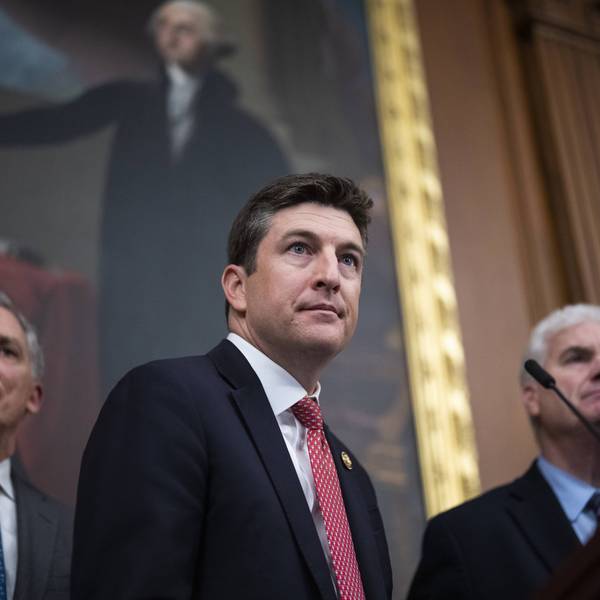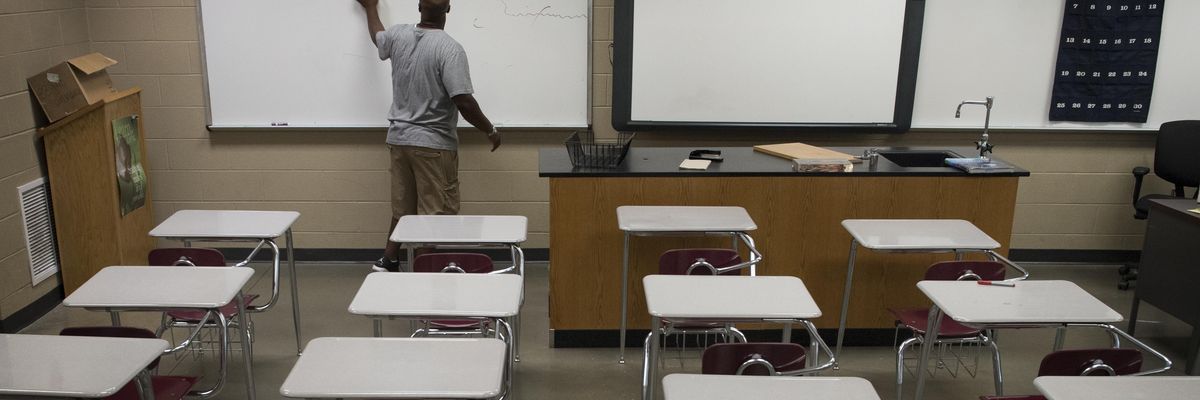Progressive critics are warning that Alabama Republican Sen. Del Marsh's so-called "Parents' Choice Act," which advanced out of committee on Wednesday, would "end state support of public education."
"It's about ending the collective commitment to and responsibility for educating the next generations."
Even if Alabama households are given money for schooling, retired teacher Peter Greene argued Wednesday in a post on his Curmudgucation blog, the egalitarian ideals that have animated public education would be thrown to the wayside in favor of a libertarian fantasy destined to exacerbate inequality.
Marsh (R-12)--whom Greene described as "a longtime champion of disinvestment in Alabama public ed, having pushed charters and charter expansion in previous years"--has called S.B. 140 the "ultimate" school choice bill. Just one day after it was filed, the legislation advanced from the Senate Education Policy Committee on Wednesday by a margin of five to three, with two abstentions.
As Greene explained, the bill would create an Education Savings Account (ESA) "in its fully realized form--every Alabama family gets every cent the state would have spent on educating their child (about $6,300 last year) and they can use it to pay for educational whatever--public school, home school, private school, tutoring, online classes, whatever."
S.B. 140 would siphon off at least $420 million from the state's Education Trust Fund and allow parents to apply to use that cash to pay "education service providers" or "vendors."
AL.com reported earlier this week that "under Marsh's bill, the first ESAs would be available at the start of the 2022-23 school year. It would allow any students who are currently enrolled in public school or in a home school to sign up for an ESA. Applications would be made available May 1 according to the bill."
"The eligible student pool grows in 2023-24 to include students in private schools whose family income does not exceed 200% of the federal poverty level," the news outlet added. "All students become eligible during the 2024-25 school year."
Alabama Education Association (AEA) executive director Amy Marlowe said Tuesday that Marsh's legislation "should be called exactly what it is--'No Vendor Left Behind'--a shell game of a voucher program to divert money from Alabama's community schools."
The teachers union leader sounded the alarm about Republicans' "mind-blowing" effort to ram through a bill that would transfer public resources to private hands before "every line... is properly reviewed and scrutinized."
Her statement, shared with Alabama Political Reporter, went on to say, in part:
There is a complete lack of transparency regarding this egregious bill by rushing it through committee this week... A bill of this magnitude that would result in more than $420 million cut from the Education Trust Fund rushed through committee without the opportunity for at least a week of scrutiny by the public and the media makes you wonder why Sen. Marsh is in such a hurry to move this bill. By moving this legislation so soon, it does not give time for education leaders and the community to provide their input.
While endorsing Marlowe's concerns about profiteering, Greene went further, characterizing S.B. 140 as an attack on the notion of public education, and by extension, the public itself.
"Yes, this bill would eat a ton of taxpayer dollars, and yes it would gut the public education system in Alabama," wrote Greene. "There is one other huge effect that comes with voucher-style bills that seems to be rarely discussed--it ends the state's involvement with and support of its children."
He continued:
"We've given you a check, and we hereby wash our hands of the whole education thing." The ultimate form of voucher is not about empowering parents. It's not even about making vendors a bunch of money. It's about getting the state out of the education business, about cutting parents and children loose. It's about ending the collective commitment to and responsibility for educating the next generations.
"Don't [dismantle education] with this notion of helping people when in fact, it will absolutely decapitate public education."
Greene is not alone.
Sen. Kirk Hatcher (D-26), a former teacher, said during Wednesday's public hearing: "The way I see this bill is if you're seeking to dismantle education, public education, then just do it. Don't do it with this notion of helping people when in fact, it will absolutely decapitate public education."
In his blog post, Greene stressed that "there are always critical questions to ask about oversight in these bills. Who will make sure that the money is actually spent on legitimate educational expenses? Who will watch out for the interests of the taxpayers?"
The 39-year educator added:
But equally critical are the safeguards for families, and ESA laws typically have none. What supports will be in place for families that don't have the time or resources to search for the right vendors (and who will make sure those supports are reliable)? What if a parent's money runs out? What if parents find their choices severely limited because the various edu-vendors won't accept their child? What if one of their vendors closes shop mid-year, leaving the child stranded? What if the vendor turns out to be a big scam because the state hasn't properly vetted the eligible vendors? What happens if parents find that the Marketplace is not for them, but in the meantime the local public school has collapsed from the money gutted from it?
The bill is being rammed through the legislature this week, and if it becomes law, it will face the hurdle that many such laws have faced--getting parents to actually use it. Watch to see if, in Alabama, Americans for Prosperity repeats its successful tactic from New Hampshire, where they went door to door to hype the new voucher program, boosting participation big time.
Roughly 725,000 students are enrolled in public schools in Alabama, AL.com noted. By contrast, in the eight states with laws authorizing ESAs--which are similar to vouchers but allow parents to use funds to pay for more than tuition--around 31,000 students are using them.
Vouchers--the mid-1950s brainchild of economist Milton Friedman, a chief architect of the neoliberal assault on public goods and unions--gained immediate popularity among segregationists eager to abandon public schools to avoid racial integration, and as historian Nancy MacLean has shown, "school 'choice' was a way station on the route to radical privatization."
AEA's Marlowe argued that "instead of this foray to divert funding from public education, Sen. Marsh's focus should be on the growing number of educator shortages within Alabama schools and the need for substantial pay raises for current educators who are already going beyond their normal call of duty."
Related Content
'Five Alarm Crisis': Teachers Union Warns Pandemic Burnout Destroying Schools
Andrea Germanos
"Private schools and educational service providers, who do not have as much accountability as public schools, should not be able to receive $420 million siphoned from the [Education Trust Fund]," said Marlowe.
"The Alabama Education Association," she added, "will work vehemently to fight this bill and protect the needs of our students and educators who are in public education."





